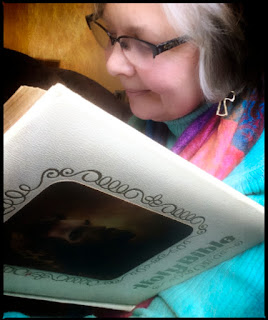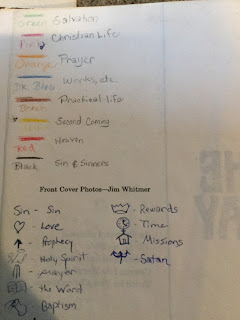The Big Idea: Study Bibles have a lot of tools to enhance your study of the Bible but there are many to choose from.
I spy a Study Bible!
As of today Christian Book Distributer's website has 2,439
different kinds of Study Bibles. Granted many of them are multiples of the same Bible, with various covers. Black or brown
leather, soft cover or hard cover, etc. Some vary mainly as being marketed to
men or women. And some vary in being King James or New International Version. Or
another version. But they have almost identical Bible helps content for the same kind of Study Bible.
Perhaps this is you. "What is a study Bible and why should I have one?
I use my YouVersion Bible App all the time."
Perhaps you have three or four Study Bibles to your name. You
like the content unique to each one.
You can get all kinds of Study Bibles. Geared for men. For women.
For teens. For teen boys. For teen girls. For professionals. Large Print. Pocket sized. Some are in the
English Standard Version. Some in the New American Standard Bible. Some in
Today's Living Version. And more.
If you wonder about the variety, here are some samples!
Apologetics Study Bible - for one who wants a defense of
the Faith
Life Application Study Bible - notes on difficult passages,
Bible life and times, and questions of application. This is so chock full of information it is one of the best selling Study Bibles.
Key Word Study Bible - Key Bible Words from Hebrew and Greek
noted and explained.
Thompson Chain Reference Bible - over 8000 topics chained
together, and cross references. A series that has been around for a while and is much beloved.
Rainbow Study Bible - uses color coding for themes
throughout the Bible.
Complete Jewish Study Bible - For both Jewish and non Jewish
people alike with explanations of Judaism to add to understanding of the
background of the Bible.
Aside from it being a very heavy book to carry around, often
with over 1000 pages, there are so many tools available to you through your
Study Bible. Before you go out to buy one, check out this list of what many
include. Then look around and compare the difference in them and what you think
might be helpful.
Study Bible Tools
Articles and photos. Many Study Bibles have articles on hard to understand subjects, or on key words, main characters in the Bible, archeological findings, and so on. Each Bible is different as to what they offer. Some have photos too, of Bible Lands, or plants mentioned in the Bible, and so on.
Book Introduction and outline.
Almost all Study Bibles have an introduction of each book of the Bible,
giving background, authorship, time reference, intended audience and themes.
Many add key verse and an outline of the book.
Concordance. A
concordance is an alphabetical listing of words or phrases used throughout the
Bible. There are listing where the word or idea is used. Strong's Exhaustive
concordance is a tome in itself that has every word of the Bible ever
mentioned, and where it is found. The concordance at the back of a study Bible
cannot be that exhaustive, but what is there is helpful when you are studying.
Cross References. Cross references in the margins will tie
together verses from other parts of the Bible. This is especially helpful when
a fulfillment of prophecy is mentioned and it is linked to the Old Testament
source of origin. Some Bibles have very few cross references, and others like
the Scofield or Thompson Chain Bible will have quite a few.
 |
| Scofield Study Bible 1917 |
You can see in this photo how a verse has a little letter next to it. You will find the corresponding cross reference verse in the middle column.
Devotional thought. Some Bibles feature special devotionals
or small articles to give insight to the Christian life. Women's Bibles are
specific to women's concerns. A Military Bible will have devotional thoughts
for those in the Armed Forces. Sometimes one Bible teacher will have his or her
teachings through the whole Bible, such as the Dr. David Jeremiah Study Bible,
or the Pursuit of God A.W. Tozer Study Bible.
Maps and charts. Most
Study Bibles have key maps for Biblical Periods. These are usually dispersed
throughout the Bible. For instance, a map of the Apostle Paul's missionary
journeys would most likely be among the Epistles written by the Apostle Paul.
There may be a chart for the Life of Paul. Each study Bible is different in
what subjects it expounds on, but you should look for a study Bible based on
the resources it has. There is always an
index, usually at the beginning, of where those maps and charts are
located.
Study notes/textual remarks/commentary. Most study Bibles
have comments that accompany multiple verses, on the bottom of the page. Some
are textual references for clarification. Some may have a full blown commentary
available, such as the Matthew Henry Study Bible.
 |
| Scofield Study Bible 1917 |
Practical considerations
Since a study Bible may be a heavy large book, you might
want it mainly for your home study and use your electronic Bible when you go to
church or Bible Study. Or you may want to mark up your Bible on the passage
your pastor is preaching from to help you remember what you are learning.
In the old days, Family Bibles were historical documents that recorded the family births, marriages and deaths. Over time I hope you will find that your go-to Study Bible will be a sort of spiritual time capsule for you. You can mark a date that a passage really spoke to you and changed your life. You can mark up passages you have studied heavily with different colors.
The Bible will help you remember favorite passages, and passages you want to share with others. As your Bible gets more and more worn, you will know that the Word of God is being used and changing your life. Beware of marking your Bible with a pen if you have the very thin leaves in it. Ball point pen will bleed through over time. Archival quality pens are ideal for that. Having the thin leaves is helpful to make the book less heavy, but the pages can also tear easily. These are a few things to consider.
A really good study Bible, especially if you get it in leather,
can be a very expensive purchase. They can be from $20-$95 or more. There are a
couple of options for you to get a nice study Bible more reasonably. Though you
may not find it in the translation you had hoped for. Yet the reference tools therein are valuable
for you have access to. If you have an Ollie's Bargain Outlet near you, they
often have a good supply of Bibles, including Study Bibles. Also thrift shops and garage sales might have
one you run across. Our daughter recently got 2 very nice Study Bibles for $1 each
at our local library book sale. All in
near new condition.
Now you might find it sad to find a Bible at a Thrift shop or garage sale. However, imagine someone being awarded one in Sunday School or at a conference, or gifted with one for Graduation or Christmas. But they already have their own Bible they are familiar with and use all the time, so they lighten their shelf and give it away. My husband and I have sometimes obtained an extra Bible at a bargain price. We knew we did not need it, but we knew we will find someone who will. We get it and we pray over them. Our give-away Bibles always find a home.
One more tip. Sometimes a publisher will offer an e-Study Bible for the kindle for free on Amazon.com for Kindle. I have about 5 study Bibles available for my kindle that way. You need to look for them under Kindle Bibles time to time and snatch them when you see them.
Now you might find it sad to find a Bible at a Thrift shop or garage sale. However, imagine someone being awarded one in Sunday School or at a conference, or gifted with one for Graduation or Christmas. But they already have their own Bible they are familiar with and use all the time, so they lighten their shelf and give it away. My husband and I have sometimes obtained an extra Bible at a bargain price. We knew we did not need it, but we knew we will find someone who will. We get it and we pray over them. Our give-away Bibles always find a home.
One more tip. Sometimes a publisher will offer an e-Study Bible for the kindle for free on Amazon.com for Kindle. I have about 5 study Bibles available for my kindle that way. You need to look for them under Kindle Bibles time to time and snatch them when you see them.
We are so privileged to be able to have the Bible in our
language. There are still thousands of people groups around the world who do
not have that yet. And we have many different translations available to us. And
we can read. In the day of King David and Paul the Apostle, the literacy rate
was much lower than it is in America today. Let us not take this for granted.
Get one of these tools, the Study Bible, and begin to investigate the depths of
what is in God's Word. It is valuable for your life and godliness. They are the
very words of God intended for YOU!






